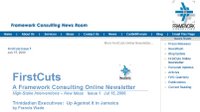 This second issue of FirstCuts has a “P.S.” sub-heading that I removed from the official version because it did not fit the eZine format, or the content of this edition. It includes the following:
This second issue of FirstCuts has a “P.S.” sub-heading that I removed from the official version because it did not fit the eZine format, or the content of this edition. It includes the following:
in our executive training sessions on feedback skills, we found that:
* Trinidadians tried to become your friend * Jamaicans tried to become your headmaster/headmistress * Barbadians tried to become your preacher
Your comments are welcome, as this was a more difficult topic to tackle.
| FirstCuts A Framework Consulting eZine High-Stake Interventions Issue 2 August 15, 2006 Developing Accountable Caribbean |
|
Editorial
If I had had any idea what it takes to launch a simple eZine, I probably wouldn’t have! The writing has turned out to be the easiest part by far. The formatting, archiving, subscriber management, software learning and other administrative duties that were required were formidable. It was a steep learning curve but I believe that I am now over the hump. And, yes, it has been worth it and thanks for the feedback that has been sent my way so far. In a few weeks, I will be asking you for your ideas, via an online survey, and I look forward to hearing from you then. In the meantime, I hope that the content continues to be provocative. In this issue, I have tried to deal with some heavier matters in a newsletter format — breaking a rule that an eZine should be fairly “light.” Depending on your reaction, I may alter this approach — let me know. |
|
Developing Accountable Caribbean Executives
“My dog is probably outside playing with your dog, right now” There is not a company we have worked with in the region that has not complained about its lack of bench strength i.e. the lack of qualified managers waiting in the wings to be promoted. Leaders Indeed, our research in the Caribbean Acquisition Project showed that companies took advantage of available acquisition opportunities, knowing full well that they would have a problem finding leadership for the new company from within their ranks. In many cases, the barrier to undertaking further acquisitions is not a lack of capital, or a lack of raw talent, but a critical capacity or skill that is missing. While there are many managers with the necessary technical Instead, they have managers who are more interested in staying out of trouble, doing the minimum, not being taken advantage of, and caring only that their personal results are good enough for the next raise. They give excuses, manufacture explanations and create reasons for poor performance, when what is really needed is solid leadership that is willing to own negative and positive results alike. They are not bad employees, but a key ingredient is missing that gives others the confidence that they can lift their concerns above a personal level, and to a corporate level. In short, there is a level above which they cannot be trusted to be accountable. A Lack of Accountability And executives do not know what to do about this. While they are vehement that they want the culture to change, they are unable to see the part they play in keeping the Caribbean work-place the way it has always been. To intervene effectively, executives and managers need to A great deal could be said about the effects of slavery, Under duress, our ancestors were brought to the region to be put to work, in most cases, enslaved. Work killed off the Perhaps as a result, today’s Caribbean workplace shows less of the ownership and accountability required of modern corporations, and more of the resentment, anger and just plain “bad mind” that one would associate with hostilities. It is against this background that the modern Caribbean manager must operate. b) The Basic Unit — Where Change Starts The modern Caribbean manager has inherited a work-culture that is marked by behaviours drawn from historical extremes on the one hand, and known everyday relationships on the other. c) Missing Skills From a wife managing a domestic helper, to a vice-president Our research and experience tell us that the critical executive In our context, it is critical to maintain relationships while These inter-related relationships are not a fault, but a strength. They are to be built on and acknowledged, rather than ignored (as many US/European programmes would encourage.) Doing this effectively, however, does not come naturally. It takes focused training and practice for most executives-in-training, and their development can only be accelerated when they are able to foster accountable reporting relationships around them. In recent feedback training we delivered, when we observed However, executives that are unskilled at holding employees to account fail to practice effective feedback conversations, and are unable to create workplaces of accountability. In so doing, they help to perpetuate the historical dysfunction that, without their intervention, is merely be passed on to future generations. They need to understand the history they are inheriting and the role that they can plan in reversing it. Their skills are critical to the Caribbean region’s success. * Useful Stuff
Tips, Ads and Links For other related entries in our blog (Chronicles from a Caribbean Cubicle) that you can read and comment on, see: Current Research Update: Study of Trinidadian Executives Working in Jamaica. We are in the process of conducting interviews and are looking forward to sharing the findings in the next 4-8 weeks. To manage this newsletter, we use an excellent programme called AWeber that you can explore here:- http://www.aweber.com/?213577 General and Newsletter Subscription Info To subscribe, please email firstcuts@aweber.com from the email address that you which to be subscribed from Please feel free to use excerpts from this newsletter as long as you give credit with a link to our page: www.fwconsulting.com FirstCuts © Copyright 2006, Framework Consulting, except where indicated otherwise. All rights reserved worldwide. Reprint only with permission from copyright holder(s). All trademarks are property of their respective owners. All contents provided as is. No express or implied income claims made herein. Your business success is dependent on many factors, including your own abilities. Advertisers are solely responsible for ad content. |
| FirstCuts: An Online Newsletter From Framework Consulting Inc. 954-323-2552 876-880-8653 3389 Sheridan Street #434 Hollywood FL 33021, USA |
P.S. Here is the paragraph taken out:
A Cross-Comparison
~~~~~~~~~~~~~~~
Recently, Framework partnered with Confida (a Trinidad-based firm)
to deliver training in effective feedback to a group of over 80
executives in three countries for a regional conglomerate. The
training followed a method of video-based coaching, that had been
delivered with different materials to hundreds of participants in
the US and Latin America.
The cultural differences were remarkable.
We found a real reluctance in the region to deliver hard-to-hear
feedback in a straightforward manner, and observed a variety of
techniques that were used to reduce risk, albeit
ineffectively. We found that the methods to do so varied by island.
When executives were faced with the need to deliver difficult
feedback,
* Trinidadians tried to become your friend
* Jamaicans tried to become your headmaster/headmistress
* Barbadians tried to become your preacher
Although these are generalizations, they tell an important story
that is worthy of further investigation.
Each of these methods of avoidance has built-in pitfalls, and
demonstrates habits that do not work when the news to be delivered
is unpleasant. They have little to do with the best of modern
management techniques.
Yet, these methods made sense when compared to the grotesque
“feedback” methods that colonial slave managers used throughout
Caribbean history to enforce control — a pat on the head for
“The Boy” when he was good, and a whipping when he was bad.
Deeply buried in the psyche of Caribbean managers is the
experience of this set of historical extremes. Buried right
beside that experience is a determination to manage differently.
However, without focused training, this determination is rarely
translated into better technique. It shows up, instead, as too
much befriending, teaching and preaching, and too little managing
by holding direct reports to account.

